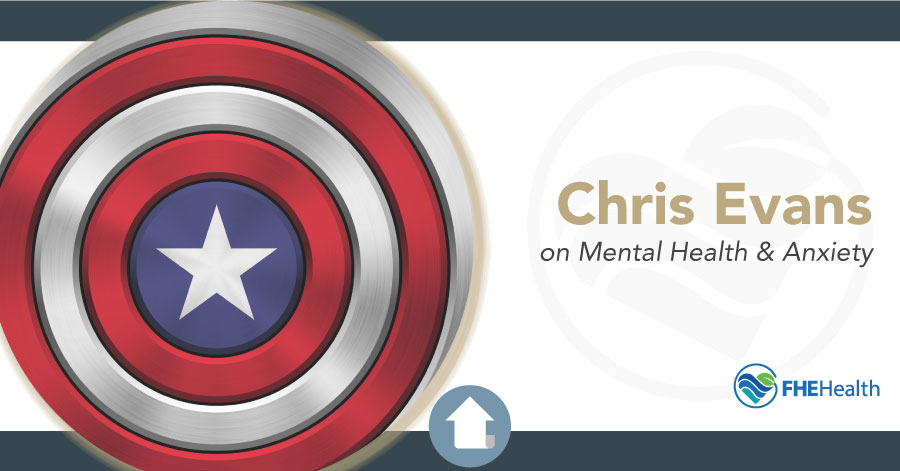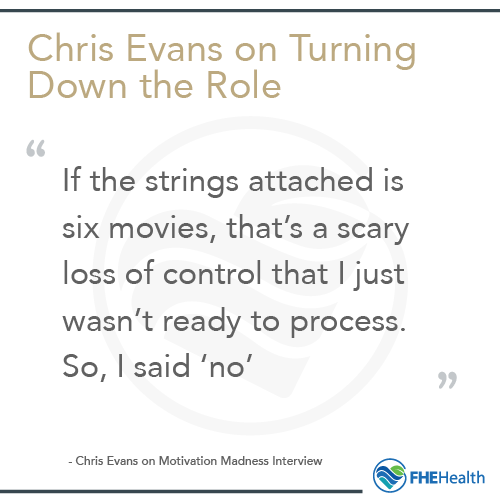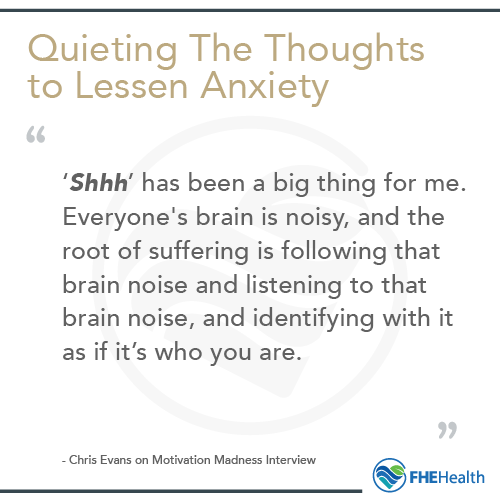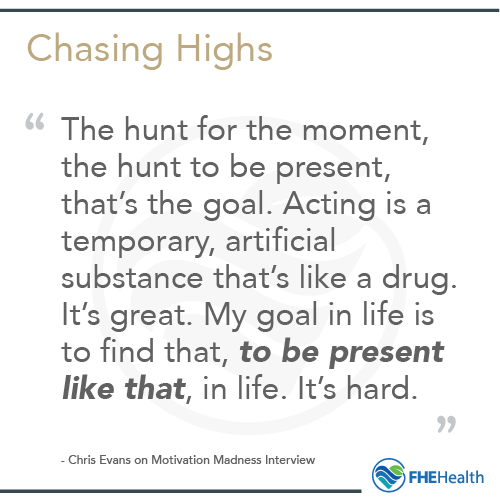
It isn’t easy being Captain America. Presenting the American hero, the do-good-all-of-the-time persona and the inspiration for plenty of young children is a lot for a single person to take on when the camera stops rolling. This has been particularly true for Chris Evans, a well-known actor who played Captain America in several movies, and who has also battled depression and anxiety.
For Evans, being an actor was something he wanted to do, but walking the red carpet and remaining in the spotlight wasn’t what he signed up for. The role of Captain America came with a lot more than acting in movies. For Chris Evans, anxiety is a real, ongoing fact. Calming his mind is an important part of living his life and acting.
Rising to Become the Representation of the American Soldier
 Before becoming Steve Rogers and Captain America, Chris Evans had a few successes and a number of struggles. He started his acting career by starring in high school productions and community theater. His first role on the screen came in the television series “The Fugitive” in 2000. He had other small parts in television before landing the big-screen “Not Another Teen Movie” in 2001. Over the years, his career continued with smaller parts until he played Johnny Storm in “Fantastic Four” in 2005. In 2011, he took the role that he’s so well known for today. “Captain American: The First Avenger” changed his life forever.
Before becoming Steve Rogers and Captain America, Chris Evans had a few successes and a number of struggles. He started his acting career by starring in high school productions and community theater. His first role on the screen came in the television series “The Fugitive” in 2000. He had other small parts in television before landing the big-screen “Not Another Teen Movie” in 2001. Over the years, his career continued with smaller parts until he played Johnny Storm in “Fantastic Four” in 2005. In 2011, he took the role that he’s so well known for today. “Captain American: The First Avenger” changed his life forever.
In an interview with Motivation Madness, Evans states that he turned down the role several times. The producers wanted him to commit to six movies, and he wasn’t sure he wanted to play the character for what could be 10 years. He says, “If the strings attached is six movies, that’s a scary loss of control that I just wasn’t ready to process. So, I said no.”
After speaking to his family, who encouraged him to move forward, he decided to turn to a therapist for help. He says, “I’ll talk to a therapist and see what they have to say. I do struggle with and get anxiety about certain things.” He continues, “It kind of shifted. It started to feel like maybe the thing you’re most scared of is the thing you should do.”
For some, overcoming anxious situations is challenging. Getting out of your mind and realizing what’s truly present is difficult, especially if you feel out of control. Seeking help to gain clarity about what’s really happening, not what’s imagined and creating the panic, is the best first step.
The Importance of Mental Well-Being
 Evans often states how overwhelming the press can be for him. From red carpet walks to press junkets, he feels pressure and anxiety. In a Rolling Stone interview, he says, “It’s part of the job, I’ve got to sell this thing. But it’s just a gross feeling. It makes me insecure.”
Evans often states how overwhelming the press can be for him. From red carpet walks to press junkets, he feels pressure and anxiety. In a Rolling Stone interview, he says, “It’s part of the job, I’ve got to sell this thing. But it’s just a gross feeling. It makes me insecure.”
It’s not uncommon for individuals to feel anxious about things they don’t like to do. Mental health disorders, including panic attacks and anxiety, can manifest when a person overthinks something or creates what-if situations that lead to a sense of fear.
Anxiety often develops when a person ends up in analysis paralysis, a state in which they analyze something so much that the outcome is often far worse than reality. This compounds stress and worsens those concerns, turning worry into a high-level stress event and even a panic attack.
Getting Out of Your Head
 Evans often speaks about his noisy brain. He says, in an interview, that he wishes he could tell a younger version of himself to “shhh.” He states, “Shhh has been a big thing for me. Everyone’s brain is noisy, and the root of suffering is following that brain noise and listening to that brain noise, and identifying with it as if it’s who you are.”
Evans often speaks about his noisy brain. He says, in an interview, that he wishes he could tell a younger version of himself to “shhh.” He states, “Shhh has been a big thing for me. Everyone’s brain is noisy, and the root of suffering is following that brain noise and listening to that brain noise, and identifying with it as if it’s who you are.”
He also states, “The moments I’ve felt my best are those moments when I’ve been able to pull that plug and say, ‘Chris, shh shh shh.’ It’s not quitting, giving up, it’s not washing your hands of the thought. It’s rising above it. It’s operating on a separate plane.”
For Evans, getting out of his head is a constant battle. Having that noisy brain leads to a continual need to question everything. To help quiet himself, he’s used meditation and Buddhism, studying in India and reading spiritualist author Eckhart Tolle’s books. He also notes that acting itself helps. He states, “The noise goes away. You’re just leaned into the experience. You’re really riding the wave of just living.”
Celebrities Speaking Out for Mental Health
The National Institute of Mental Health reports that nearly 1 in every 5 U.S. adults struggled with mental illness in 2017. That accounts for 46.6 million people. Many never sought help because of a lack of social acceptance of mental health. When a celebrity speaks out, such as Chris Evans on panic attacks or depression, this creates an opportunity for every other person to realize mental health problems aren’t rare and most certainly don’t make you a bad person.
Evans speaking out about mental illness and how he struggles with anxiety, even when auditioning for roles after starring in 11 films as Captain America, helps to show the reality of anxiety. If this can happen to an accomplished, well-respected actor, it can happen to anyone. When Chris Evans speaks openly about mental illness in any form, even if he hasn’t been diagnosed with one, he enables other people to relate to what’s happening.
A key aspect of Evans’ ability to manage his anxiety is to try to remain in the moment. He states in the Motivation Madness interview, “The hunt for the moment, the hunt to be present, that’s the goal. Acting is a temporary, artificial substance that’s like a drug. It’s great. My goal in life is to find that, to be present like that, in life. It’s hard.”






